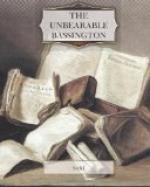“I want it dreadfully,” said Comus, sulkily, “and you’ve heaps of other things to put bread-and-butter in.”
For the moment he was possessed by an overmastering desire to keep the dish at all costs; a look of greedy determination dominated his face, and he had not for an instant relaxed his grip of the coveted object.
Elaine was genuinely angry by this time, and was busily telling herself that it was absurd to be put out over such a trifle; at the same moment a sense of justice was telling her that Comus was displaying a good deal of rather shabby selfishness. And somehow her chief anxiety at the moment was to keep Courtenay Youghal from seeing that she was angry.
“I know you don’t really want it, so I’m going to keep it,” persisted Comus.
“It’s too hot to argue,” said Elaine.
“Happy mistress of your destinies,” laughed Youghal; “you can suit your disputations to the desired time and temperature. I have to go and argue, or what is worse, listen to other people’s arguments, in a hot and doctored atmosphere suitable to an invalid lizard.”
“You haven’t got to argue about a bread-and-butter dish,” said Elaine.
“Chiefly about bread-and-butter,” said Youghal; “our great preoccupation is other people’s bread-and-butter. They earn or produce the material, but we busy ourselves with making rules how it shall be cut up, and the size of the slices, and how much butter shall go on how much bread. That is what is called legislation. If we could only make rules as to how the bread-and-butter should be digested we should be quite happy.”
Elaine had been brought up to regard Parliaments as something to be treated with cheerful solemnity, like illness or family re-unions. Youghal’s flippant disparagement of the career in which he was involved did not, however, jar on her susceptibilities. She knew him to be not only a lively and effective debater but an industrious worker on committees. If he made light of his labours, at least he afforded no one else a loophole for doing so. And certainly, the Parliamentary atmosphere was not inviting on this hot afternoon.
“When must you go?” she asked, sympathetically.
Youghal looked ruefully at his watch. Before he could answer, a cheerful hoot came through the air, as of an owl joyously challenging the sunlight with a foreboding of the coming night. He sprang laughing to his feet.
“Listen! My summons back to my galley,” he cried. “The Gods have given me an hour in this enchanted garden, so I must not complain.”
Then in a lower voice he almost whispered, “It’s the Persian debate to-night,”
It was the one hint he had given in the midst of his talking and laughing that he was really keenly enthralled in the work that lay before him. It was the one little intimate touch that gave Elaine the knowledge that he cared for her opinion of his work.




